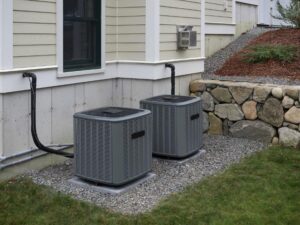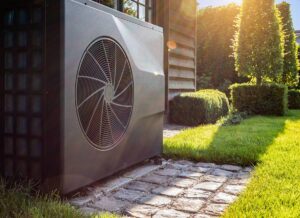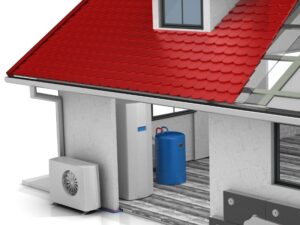Central Air Conditioning: What Are Your Options?
Central air conditioning systems play a large role in a home’s indoor air quality and comfort. Understanding the differences between central air conditioning systems can help you make an informed decision when upgrading or installing a new system.
How Central Air Works
Central air conditioning systems circulate air throughout the home using ductwork. The system uses a combination of supply air ducts that bring conditioned air throughout the home with return ducts that return the air to the system to be conditioned. In addition to cooling the air, the AC also removes some of the moisture in the air, resulting in greater comfort.
Types of Central Air Conditioning Systems
There are two types of air condition systems: split system units and packaged units.
- Spilt system units have two separate pieces of equipment. The first unit is installed outdoors and contains the system’s condenser and compressor. The second unit is installed inside the home and includes the evaporator. In many split systems, the indoor unit also houses the furnace or heat pump used to heat the home. In the event that your home doesn’t currently have a cooling system, a split system may be the more economical option.
- Packaged units have one piece of equipment that’s installed outdoors and contains the condenser, compressor and evaporator. In addition to the cooling system, packaged units often contain a furnace, eliminating a need for separate heating unit inside of the home. These types of units are typically installed on a building’s roof or on a concrete slab adjacent to the home. In addition to residential use, these types of units are often used in small scale commercial applications.
Selecting the Right Unit for Your Home
As a whole, central air conditioning units are more energy efficient than units that cool only one room at a time. Additionally, available units differ in energy efficiency between models. The energy efficiency of a unit should be among the criteria evaluated before making a selection. However, if your home doesn’t currently have ductwork, it’s important to factor the cost of adding ductwork into your overall budget.
For homes that are replacing an existing air conditioning system, there are several things to consider:
- If you’re replacing an older unit, an option may be to replace the outdoor compressor. Before doing so, consult a professional to ensure the new unit is a good match for the indoor components. Depending on the age and type of system you have, it may be a wiser investment to replace the entire cooling system.
- Consider the age and energy efficiency of your home’s current central air conditioner. Air conditioners that are currently on the market use between 30 and 50 percent less energy than those that were manufactured just a decade ago. In fact, a new unit may save as much as 20 to 40 percent of the energy costs of a unit that was made only 10 years ago.
- Sizing is important to the efficiency of your A/C. An HVAC professional is best equipped to provide accurate sizing and help determine the type of unit that’s best for your home. A unit that’s too small won’t be able to provide an adequate level of comfort on hot days, and a unit that’s too large won’t function efficiently.
- SEER ratings provide insight on each model’s efficiency. Also known as the seasonal energy efficiency ratio, SEER ratings provide a numeric value that represents how much energy is used to generate a specific level of cooled air. The higher the SEER value, the higher the level of energy efficiency.
Additional Features
There are a number of additional features available on central air conditioning units that may enhance your indoor air comfort:
- Variable speed air handlers
- Units that operate quietly
- The option to run the fan only to allow air to circulate while not using the air conditioner
- An indicator light to remind homeowners to change the system’s air filter
- A delay switch enabling the fan to run for several minutes after the compressor stops running.
For professional advice on your central air conditioning options, contact All American Heating & Cooling today.
Image Provided by Shutterstock.com
You May Also Like

Don’t Skip Spring AC Maintenance This Year in Parrish, FL
It’s a good idea to have air conditioning maintenance performed before summertime temperatures start soaring. Here are a few reasons every homeowner… Continue Reading Don’t Skip Spring AC Maintenance This Year in Parrish, FL…

Can I Use My Heat Pump More Efficiently in Sarasota, FL?
You installed your heat pump because it offers a highly efficient and reliable way to heat your Sarasota, FL, home. While it’s… Continue Reading Can I Use My Heat Pump More Efficiently in Sarasota, FL?…

Why Is My Heat Pump in Sarasota, FL, Tripping the Breaker?
A circuit breaker trips whenever an appliance in your Sarasota, FL, home draws excessive electricity. One of the appliances that may trip… Continue Reading Why Is My Heat Pump in Sarasota, FL, Tripping the Breaker?…

